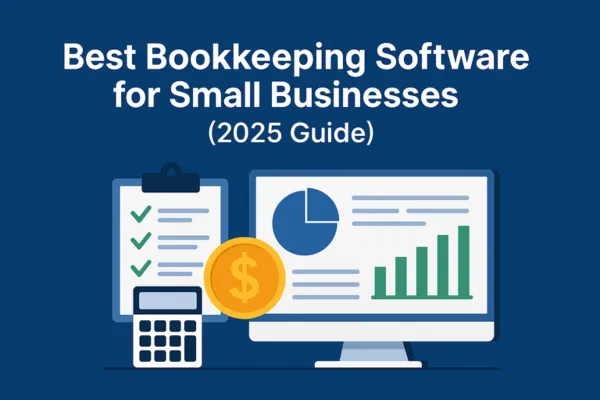
Best Bookkeeping Software for Small Businesses (2025 Guide)
Running a small business means wearing a dozen hats, and bookkeeping is often one of the most time-consuming. The right bookkeeping software can help you stay organized, track expenses, send invoices, and prepare for tax season with confidence. But with so many platforms on the market—QuickBooks, Xero, FreshBooks, Wave, Zoho: how do you choose the right one?
This guide breaks down the best bookkeeping software options for 2025, highlighting features, pricing, and which tools work best for your business needs. If you're not sure whether to stick with software or hire a professional, we’ll cover that too.
What to Look for in Bookkeeping Software
The best bookkeeping tool for your business should include:
Ease of Use – A simple, intuitive dashboard to track everything quickly
Bank & Payment Integration – Syncs with your bank and platforms like Stripe or PayPal
Invoicing Tools – Customizable, professional invoices with reminders and payment tracking
Financial Reports – Built-in profit and loss reports, cash flow statements, and balance sheets
Payroll Add-ons – Option to add employee or contractor payroll processing
Scalability – Grows with your business so you don’t have to switch platforms later

Top 5 Bookkeeping Software Picks for 2025

1. QuickBooks Online – Best Overall for Small Businesses
Why it stands out: All-in-one dashboard, robust reporting, and strong integrations
Best for: Most business types, especially if you plan to work with a CPA or bookkeeper
Price: $30–$90/month depending on plan
Notable features: Mobile app, mileage tracker, receipt capture, and tax tools

2. Xero – Best for Multi-User Teams
Why it stands out: Unlimited users, clean interface, and advanced project tracking
Best for: Teams that need shared access or frequent collaboration
Price: $15–$78/month
Notable features: Real-time dashboard and powerful integrations with over 800 apps

3. FreshBooks – Best for Service-Based Businesses
Why it stands out: Invoicing, time tracking, and client communication in one place
Best for: Consultants, agencies, freelancers, and coaches
Price: $17–$55/month
Notable features: Invoice status tracking, late payment reminders, and proposals

4. Wave – Best Free Bookkeeping Software
Why it stands out: Free core features, including accounting, invoicing, and receipt scanning
Best for: Solo entrepreneurs, freelancers, or early-stage startups
Price: Free (pay only for payroll or payment processing)
Notable features: Clean interface and mobile-friendly invoicing

5. Zoho Books – Best for Automation and Custom Workflows
Why it stands out: Workflow automation, custom modules, and tight ecosystem with Zoho apps
Best for: Tech-savvy businesses looking to automate repetitive tasks
Price: $0–$275/month
Notable features: Advanced automation rules, client portal, and free plan under $50K revenue
Frequently Asked Questions
Do I still need a bookkeeper if I use software?
Yes. Software helps with organization, but it doesn't replace a professional who can review your numbers, catch costly mistakes, and advise you on strategy and compliance.
Can I switch bookkeeping software later?
Yes, but it can be time-consuming and sometimes risky if data is lost. Choose a platform that can grow with your business.
Which software is best for startups?
Wave or Zoho Books (free plans) are ideal for startups. QuickBooks and FreshBooks offer more features once you start scaling.
Final Thoughts
In 2025, small business owners have more bookkeeping tools at their fingertips than ever before. Choosing the right software depends on your goals, budget, and how hands-on you want to be. If you're unsure where to start—or need help setting up your books the right way—we’re here to help.
Coach2Consulting offers free consultations to small business owners looking to improve their financial systems. Reach out today to get a personalized recommendation.



